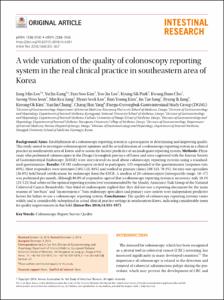KUMEL Repository
1. Journal Papers (연구논문)
1. School of Medicine (의과대학)
Dept. of Internal Medicine (내과학)
A wide variation of the quality of colonoscopy reporting system in the real clinical practice in southeastern area of Korea
- Keimyung Author(s)
- Park, Kyung Sik; Lee, Yoo Jin; Cho, Kwang Bum
- Department
- Dept. of Internal Medicine (내과학)
- Journal Title
- Intestinal Research
- Issued Date
- 2016
- Volume
- 14
- Issue
- 4
- Keyword
- Colonoscopy; Report; Survey; Quality
- Abstract
- Background/Aims: Establishment of a colonoscopy reporting system is a prerequisite to determining and improving quality.
This study aimed to investigate colonoscopists’ opinions and the actual situation of a colonoscopy reporting system in a clinical
practice in southeastern area of Korea and to assess the factors predictive of an inadequate reporting system. Methods: Physicians
who performed colonoscopies in the Daegu-Gyeongbuk province of Korea and were registered with the Korean Society
of Gastrointestinal Endoscopy (KSGE) were interviewed via mail about colonoscopy reporting systems using a standardized
questionnaire. Results: Of 181 endoscopists invited to participate, 125 responded to the questionnaires (response rate,
69%). Most responders were internists (105/125, 84%) and worked in primary clinics (88/125, 70.4%). Seventy-one specialists
(56.8%) held board certifications for endoscopy from the KSGE. A median of 20 colonoscopies (interquartile range, 10–47)
was performed per month. Although 88.8% of responders agreed that a colonoscopy reporting system is necessary, only 18.4%
(23/125) had achieved the optimal reporting system level recommended by the Quality Assurance Task Group of the National
Colorectal Cancer Roundtable. One-third of endoscopists replied that they did not use a reporting document for the main
reasons of “too busy” and “inconvenience.” Non-endoscopy specialists and primary care centers were independent predictive
factors for failure to use a colonoscopy reporting system. Conclusions: The quality of colonoscopy reporting systems varies
widely and is considerably suboptimal in actual clinical practice settings in southeastern Korea, indicating considerable room
for quality improvements in this field.
- Publisher
- School of Medicine
- Citation
- Jung Min Lee et al. (2016). A wide variation of the quality of colonoscopy reporting system in the real clinical practice in southeastern area of Korea. Intestinal Research, 14(4), 351–357. doi: 10.5217/ir.2016.14.4.351
- Type
- Article
- ISSN
- 1598-9100
- Appears in Collections:
- 1. School of Medicine (의과대학) > Dept. of Internal Medicine (내과학)
- 파일 목록
-
-
Download
 oak-2017-0170.pdf
기타 데이터 / 309.46 kB / Adobe PDF
oak-2017-0170.pdf
기타 데이터 / 309.46 kB / Adobe PDF
-
Items in Repository are protected by copyright, with all rights reserved, unless otherwise indicated.